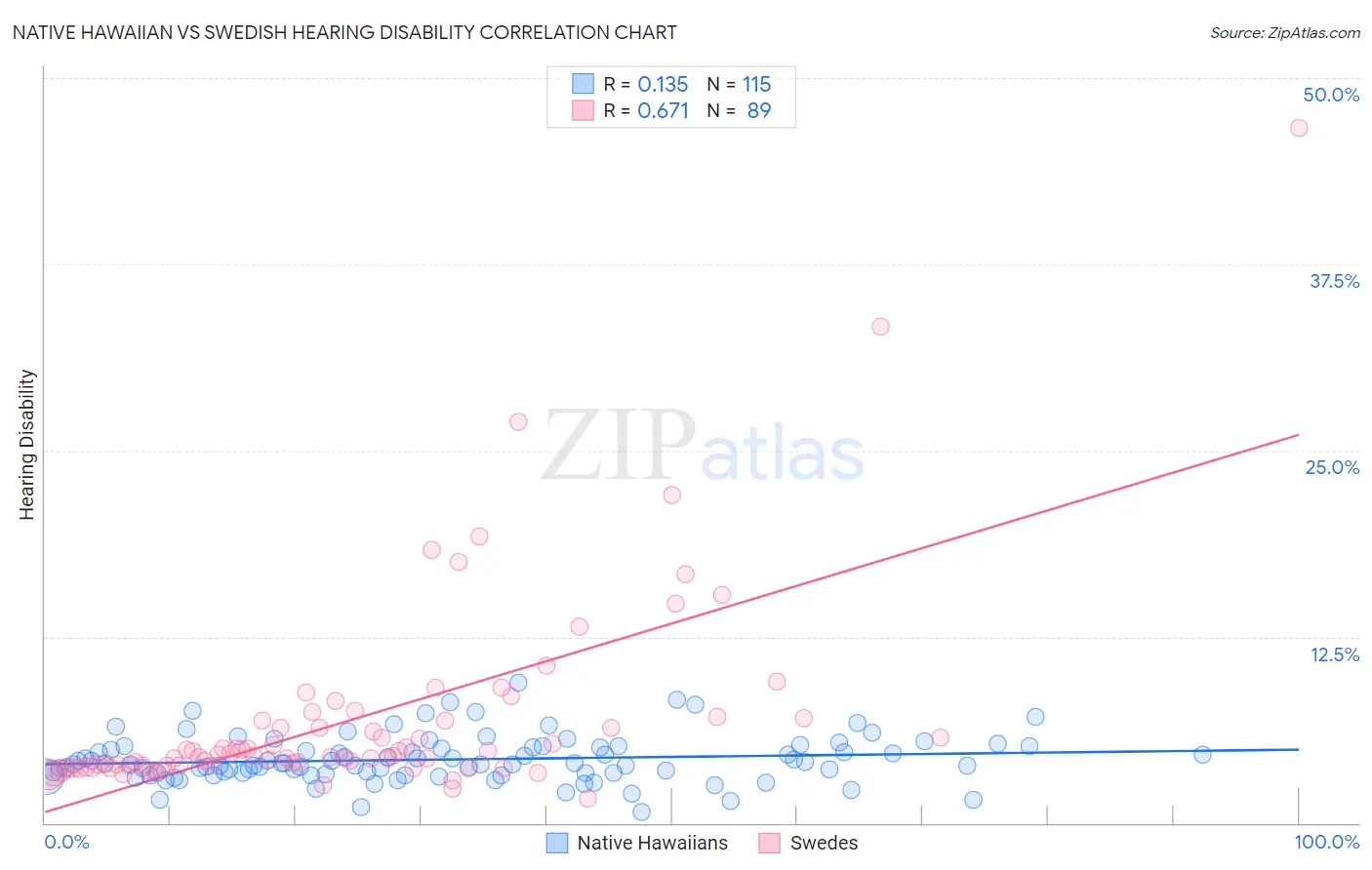Native Hawaiian vs Swedish Hearing Disability
COMPARE
Native Hawaiian
Swedish
Hearing Disability
Hearing Disability Comparison
Native Hawaiians
Swedes
3.7%
HEARING DISABILITY
0.0/ 100
METRIC RATING
292nd/ 347
METRIC RANK
3.6%
HEARING DISABILITY
0.0/ 100
METRIC RATING
282nd/ 347
METRIC RANK
Native Hawaiian vs Swedish Hearing Disability Correlation Chart
The statistical analysis conducted on geographies consisting of 331,966,611 people shows a poor positive correlation between the proportion of Native Hawaiians and percentage of population with hearing disability in the United States with a correlation coefficient (R) of 0.135 and weighted average of 3.7%. Similarly, the statistical analysis conducted on geographies consisting of 538,765,459 people shows a significant positive correlation between the proportion of Swedes and percentage of population with hearing disability in the United States with a correlation coefficient (R) of 0.671 and weighted average of 3.6%, a difference of 2.1%.

Hearing Disability Correlation Summary
| Measurement | Native Hawaiian | Swedish |
| Minimum | 0.70% | 1.7% |
| Maximum | 9.4% | 46.7% |
| Range | 8.7% | 45.0% |
| Mean | 4.3% | 7.0% |
| Median | 4.0% | 4.5% |
| Interquartile 25% (IQ1) | 3.3% | 3.8% |
| Interquartile 75% (IQ3) | 5.1% | 6.9% |
| Interquartile Range (IQR) | 1.7% | 3.1% |
| Standard Deviation (Sample) | 1.6% | 6.8% |
| Standard Deviation (Population) | 1.5% | 6.8% |
Demographics Similar to Native Hawaiians and Swedes by Hearing Disability
In terms of hearing disability, the demographic groups most similar to Native Hawaiians are Finnish (3.7%, a difference of 0.060%), Norwegian (3.7%, a difference of 0.060%), White/Caucasian (3.7%, a difference of 0.080%), Chinese (3.7%, a difference of 0.21%), and Iroquois (3.7%, a difference of 0.30%). Similarly, the demographic groups most similar to Swedes are Scandinavian (3.6%, a difference of 0.090%), French American Indian (3.6%, a difference of 0.15%), Slovak (3.6%, a difference of 0.21%), Blackfeet (3.6%, a difference of 0.25%), and Basque (3.6%, a difference of 0.48%).
| Demographics | Rating | Rank | Hearing Disability |
| Immigrants | Nonimmigrants | 0.0 /100 | #277 | Tragic 3.6% |
| Basques | 0.0 /100 | #278 | Tragic 3.6% |
| Slovaks | 0.0 /100 | #279 | Tragic 3.6% |
| French American Indians | 0.0 /100 | #280 | Tragic 3.6% |
| Scandinavians | 0.0 /100 | #281 | Tragic 3.6% |
| Swedes | 0.0 /100 | #282 | Tragic 3.6% |
| Blackfeet | 0.0 /100 | #283 | Tragic 3.6% |
| Immigrants | Micronesia | 0.0 /100 | #284 | Tragic 3.6% |
| Sioux | 0.0 /100 | #285 | Tragic 3.6% |
| Delaware | 0.0 /100 | #286 | Tragic 3.6% |
| Spanish | 0.0 /100 | #287 | Tragic 3.7% |
| Irish | 0.0 /100 | #288 | Tragic 3.7% |
| Chinese | 0.0 /100 | #289 | Tragic 3.7% |
| Whites/Caucasians | 0.0 /100 | #290 | Tragic 3.7% |
| Finns | 0.0 /100 | #291 | Tragic 3.7% |
| Native Hawaiians | 0.0 /100 | #292 | Tragic 3.7% |
| Norwegians | 0.0 /100 | #293 | Tragic 3.7% |
| Iroquois | 0.0 /100 | #294 | Tragic 3.7% |
| Welsh | 0.0 /100 | #295 | Tragic 3.7% |
| Pima | 0.0 /100 | #296 | Tragic 3.7% |
| Immigrants | Azores | 0.0 /100 | #297 | Tragic 3.7% |